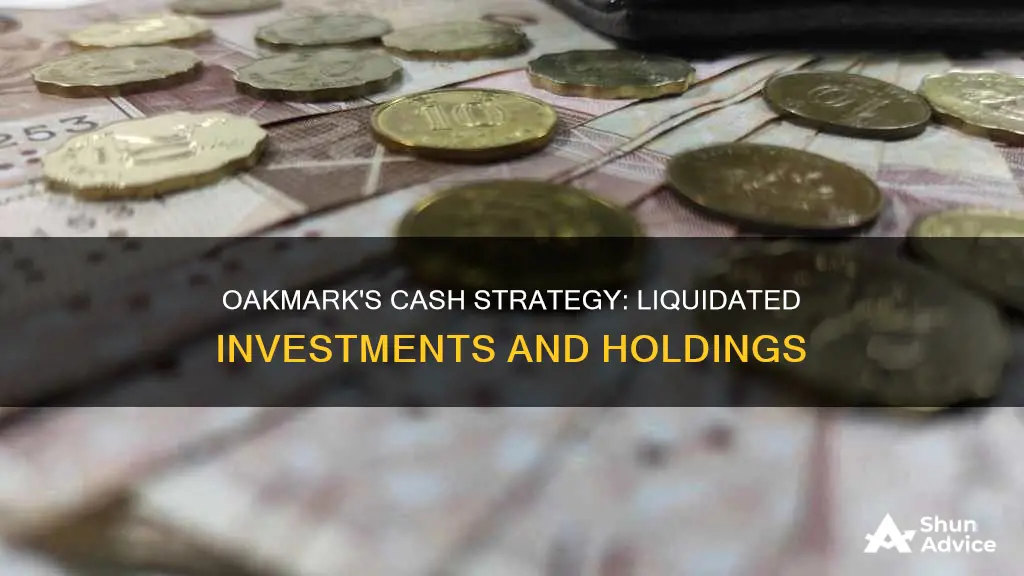
Oakmark Funds are advised by Harris Associates L.P., a subsidiary of Natixis Investment Managers, L.P. Harris Associates has been providing tailored investment solutions for wealthy individuals and families since 1976. The Oakmark Funds include the Oakmark Fund, Oakmark Select, Oakmark Global, Oakmark International, Oakmark International Small Cap, Oakmark Equity and Income, and Oakmark Bond. These funds generally seek long-term capital appreciation by investing in large-cap U.S. companies, foreign stocks, or fixed-income securities. While the funds have different strategies and holdings, they are all managed by Harris Associates, which follows a value investing philosophy.
What You'll Learn

Oakmark's investment philosophy
- The Primacy of Risk Control: Oakmark prioritises preventing losses over merely seeking profits. They believe that superior performance in challenging economic periods is a true testament to a manager's skill, rather than just accepting higher risk.
- Emphasis on Consistency: Oakmark strives for a high batting average rather than a mix of outstanding successes and dismal failures. They aim for consistent results over time, avoiding extreme fluctuations between top and bottom-quartile results.
- The Importance of Market Inefficiency: Oakmark acknowledges the significance of market inefficiency in achieving superior investment results. They focus on markets where skilled and dedicated research can lead to a "knowledge advantage," enabling them to make informed investment decisions.
- The Benefits of Specialisation: Oakmark insists that each of its portfolios focuses on a single investment specialty, ensuring explicit charters and no surprises for clients. This specialisation allows clients interested in specific asset classes to tailor their investments accordingly.
- Macro-forecasting Not Critical to Investing: Oakmark's investment strategy is bottom-up, based on in-depth, company-specific research. They believe that superior knowledge of individual companies and their securities is more critical to excellent performance than predicting economic, interest rate, or market trends.
- Disavowal of Market Timing: Oakmark does not believe in market timing and keeps portfolios fully invested when attractively priced assets are available. They prioritise investing in specific market niches over attempting to predict market movements.
In addition to these principles, Oakmark is a long-term value investor, employing a consistent investment philosophy and a fundamentally driven research process. They seek to identify companies trading at a substantial discount to their underlying business value and patiently wait for the gap between price and value to narrow.
Restricted Cash: A Viable Investment Option?
You may want to see also

Oakmark's funds
Oakmark Funds are advised by Harris Associates L.P., an autonomous subsidiary of Natixis Investment Managers, L.P. Harris Associates has provided tailored investment solutions for wealthy individuals and families since 1976.
Oakmark Funds include:
- Oakmark Select: A non-diversified fund (about 20 stocks) that seeks long-term capital appreciation by generally investing in mid- and large-cap U.S. companies.
- Oakmark Fund: A diversified fund that seeks long-term capital appreciation by generally investing in larger capitalization U.S. companies.
- Oakmark Global: Invests primarily in a diversified portfolio of common stocks of U.S. and non-U.S. companies. The fund's all-cap mandate allows investment across the market-cap spectrum.
- Oakmark Global Select: A non-diversified portfolio of U.S. and non-U.S. common stocks. The fund typically holds about 20 individual securities, with large-cap companies eligible for investment.
- Oakmark International: Invests in a diversified portfolio of common stocks of non-U.S. companies. The fund generally focuses on mid- and large-cap companies, though small-cap companies are also eligible for investment.
- Oakmark International Small Cap: Seeks capital appreciation by investing in small-cap companies located outside the U.S.
- Oakmark Equity and Income: Seeks current income and preservation and growth of capital. The fund is primarily made up of U.S. equity and fixed-income securities.
- Oakmark Bond: Invests primarily in a diversified portfolio of bonds and other fixed-income securities.
Oakmark Funds have different share classes, including Investor Class, Advisor Class, Institutional Class, and R6 Class, with varying minimum investment requirements. The funds are no-load, meaning shares are sold without a commission or sales charge.
Investing Activities: Statement of Cash Flows Impact
You may want to see also

Oakmark's fees
Mutual Fund Fees
Mutual fund fees are charges incurred by investors who hold mutual funds. These fees cover various costs such as shareholder transaction costs, investment advisory fees, and marketing and distribution expenses. Oakmark, like other mutual funds, passes these costs on to investors.
There are different types of mutual fund fees, including initial sales fees, deferred fees, and other annual fees. Initial sales fees are typically paid to brokers as a commission when shares are purchased, while deferred fees are charged when investors redeem their shares.
The Net Expense Ratio, which can be found in a fund's annual report or prospectus, is an important metric for understanding the fees associated with a mutual fund. It represents the fund's total annual operating expenses as a percentage of the value of an investor's investment.
Oakmark Fund Fees
Now, let's take a closer look at the fees associated with Oakmark Funds specifically:
- Oakmark International Small Cap Fund: This fund carries a net expense ratio of 1.34% for Class Retirement: OAZMX.
- Oakmark Select Fund: While the exact fees are not explicitly stated, the fund has a gross expense ratio of 1.00% as of the most recent prospectus dated January 28, 2024.
- Oakmark Fund: This fund has a net expense ratio of 0.91%. Additionally, it is worth noting that there are no commissions or sales charges associated with investing in Oakmark Funds, as they are no-load funds.
IRA and Coverdell Education Savings Accounts Fees
Oakmark also charges certain fees for IRA and Coverdell Education Savings Accounts:
- IRA Accounts: There is a one-time setup fee of $5.00 per fund account and an annual maintenance fee of $15.00 per Social Security Number.
- Coverdell Education Savings Accounts: These accounts have a one-time setup fee of $5.00 per fund account and an annual maintenance fee of $10.00 per Social Security Number.
Redemption Fees
When redeeming shares, Oakmark requires a Medallion Signature Guarantee (MSG) stamp under certain circumstances, including:
- Redemption proceeds exceeding $100,000.
- Proceeds being sent to a bank account not on file or recently added online.
- Address changes within the last 15 days.
- Proceeds being sent to someone other than the account owner(s).
Additionally, there is a $5 fee for receiving redemption proceeds via wire transfer.
Investments and Cash Equivalents: What's the Real Difference?
You may want to see also

Oakmark's performance
Oakmark Select Fund
The Oakmark Select Fund is a non-diversified fund that invests primarily in mid- and large-cap US companies, with a focus on long-term capital appreciation. As of September 30, 2024, the fund had a net expense ratio of 1.00% and total net assets of $1,759.98 million. The fund's performance since its inception on November 1, 1996, has been positive, with a growth of a $10,000 investment to a value of over $35,000. However, past performance is not a guarantee of future results.
Oakmark Global Fund
The Oakmark Global Fund invests in a diversified portfolio of common stocks of US and non-US companies across the market capitalization spectrum. As of September 30, 2024, the fund had a net expense ratio of 0.94% for the Investor Share Class and 0.90% for the Advisor Share Class. The fund's performance varies depending on the share class. The Investor Share Class had total net assets of $139.92 million, while the Advisor Share Class had total net assets of $133.84 million.
Oakmark International Fund
The Oakmark International Fund invests in a diversified portfolio of common stocks of non-US companies, primarily focusing on mid- and large-cap companies. As of September 30, 2024, the fund had a net expense ratio of 0.88% for the Investor Share Class and 0.75% for the Advisor Share Class. The fund's performance also varies by share class. The Investor Share Class had total net assets of $2,304.79 million, while the Advisor Share Class had total net assets of $2,899.06 million.
Oakmark Equity and Income Fund
The Oakmark Equity and Income Fund seeks current income and preservation and growth of capital. The fund is primarily made up of US equity and fixed-income securities. As of September 30, 2024, the fund had a net expense ratio of 0.61% and total net assets of $592.90 million. The fund's performance is not guaranteed and can be affected by various factors, including changes in the financial markets and the fund's investment strategies.
Oakmark Bond Fund
The Oakmark Bond Fund invests primarily in a diversified portfolio of bonds and other fixed-income securities. As of September 30, 2024, the fund had a net expense ratio of 0.54% and total net assets of $20.16 million. The fund's performance can be influenced by changes in interest rates, credit risk, and other economic and market factors.
It is important to note that the performance of Oakmark's funds can vary over time and is subject to various factors and risks. Investors should carefully consider their investment objectives and conduct their own research or consult a financial advisor before making any investment decisions.
Best Places to Invest Your Cash Today
You may want to see also

Oakmark's risks
Oakmark Funds are advised by Harris Associates L.P., an autonomous subsidiary of Natixis Investment Managers, L.P. The funds are tailored towards wealthy individuals and families, providing investment solutions for long-term capital appreciation.
There are several risks associated with investing in Oakmark Funds. Firstly, the funds may hold a relatively small number of securities, which increases volatility. This means that the performance of each holding will have a more significant impact on the fund's total return. While this strategy has the potential to generate attractive returns, it also comes with higher risk.
Secondly, Oakmark Funds may invest in mid-cap and large-cap companies, with a focus on U.S. and non-U.S. common stocks. The performance of these stocks can be volatile, particularly for mid-sized companies, which may underperform stocks of small and large companies during certain periods.
Thirdly, Oakmark Funds may have a bias towards specific sectors, such as financials and energy. This sector weighting can differ significantly from the benchmark indices, such as the S&P 500. While fund managers seek to identify undervalued companies with growth potential, there is a risk that these sectors may underperform or that the fund's active stock selection may not meet expectations.
Additionally, Oakmark Funds are subject to standard market risks, including interest rate risk and credit risk. Changes in interest rates can cause fluctuations in bond values, and there is a possibility that bond issuers may not be able to make principal and interest payments.
It is important to note that past performance is not a guarantee of future results, and total returns may vary. Investors should carefully consider these risks before investing in Oakmark Funds.
Understanding the Investing Activities on a Cash Flow Statement
You may want to see also
Frequently asked questions
You can purchase shares by adding a new Oakmark Fund to your existing account online or by completing a New Account Form. You can also buy additional shares online, by phone or by mail.
We require a Medallion Signature Guarantee (MSG) stamp if redemption proceeds are greater than $100,000, or if they are to be sent to a bank account that is not on file or was added online within the last 60 days. You can redeem shares online, by phone or by mail.
The Oakmark Funds offer four share classes to meet the unique needs of the mutual fund marketplace: Investor Class, Advisor Class, Institutional Class and R6 Class. All classes are available to purchase directly and through certain financial intermediaries.







